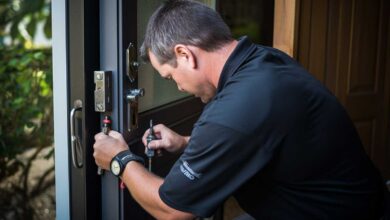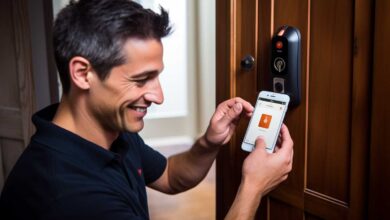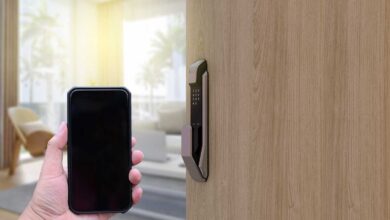DIY Home Lock Repair: Pros & Cons Explored
KEY TAKEAWAYS
Home lock repair restores lock functionality in residences. It addresses issues like broken mechanisms, faulty deadbolts, or malfunctioning latch bolts. While some homeowners hire locksmiths, others opt for DIY repairs, citing cost savings and empowerment.
Doing it yourself can be cost-effective and offers control over the process. However, without proper knowledge, DIY might lead to further damage or security risks. For those short on time or facing complex issues, professional locksmiths ensure efficiency and security. Evaluate your skills and the lock’s complexity before choosing DIY.
Pros and Cons of DIY Home Lock Repair
DIY home lock repair is both cost-effective and empowering for homeowners, but it’s essential to weigh its pros and cons. This approach can yield significant savings, as professional locksmith services can be pricey, especially for intricate lock issues. DIY repairs offer control, fostering confidence and reducing reliance on external help.
However, for those unfamiliar with lock systems, DIY might introduce further issues or compromise security. In cases where locks are pivotal to security, professional locksmiths equipped with expertise and tools are preferable.
Time constraints also matter; lock repairs demand detail and patience. If time is limited, a professional might be more efficient. In sum, while DIY offers advantages, assess your experience, the complexity of the lock, and your available time before proceeding.
Professional Locksmiths
DIY home lock repair is both cost-effective and empowering for homeowners, but it’s essential to weigh its pros and cons. This approach can yield significant savings, as professional locksmith services can be pricey, especially for intricate lock issues. DIY repairs offer control, fostering confidence and reducing reliance on external help.
However, for those unfamiliar with lock systems, DIY might introduce further issues or compromise security. In cases where locks are pivotal to security, professional locksmiths equipped with expertise and tools are preferable.
Time constraints also matter; lock repairs demand detail and patience. If time is limited, a professional might be more efficient. In sum, while DIY offers advantages, assess your experience, the complexity of the lock, and your available time before proceeding.
The Advantages of Hiring a Professional Locksmith
Professional locksmiths offer enhanced security through their deep expertise in various lock mechanisms. Hiring them ensures the ff:
-
Efficient handling of everything from broken locks to high-security systems.
-
Immediate problem diagnosis and optimal solutions for property security.
-
Peace of mind, knowing experts have repaired or installed locks.
-
Time savings, as locksmiths swiftly handle repairs or installations.
-
Access to advanced lock options and security systems beyond typical hardware stores.
-
Up-to-date knowledge of the latest lock technologies, ensuring top-notch security.
When to Hire a Professional vs. DIY
While DIY projects can be cost-effective, the risks might outweigh the benefits. Consider hiring professionals when:
-
Dealing with complex lock issues or high-security locks.
-
Installing new locks to ensure proper alignment and security.
-
Time constraints prevent thorough DIY efforts.
-
Requiring advanced lock technology and systems.
-
Prioritizing maximum home security and peace of mind.
Common Lock Issues and Solutions
Locks are vital in keeping our homes and belongings safe and secure. However, like any mechanical device, they can sometimes encounter issues that require attention and repair.
Understanding common lock problems and their solutions can save you time, money, and potential headaches. Here are some of the most common lock issues and how to address them:
Sticking or Jammed Locks
Keys can get stuck due to debris or poor lubrication. Use silicone lubricants or powdered graphite. If unresolved, hire a locksmith.
Misaligned Deadbolt or Latch
Changes in weather, wear, and tear can cause misalignment. Tighten strike plate screws or realign. If unsuccessful, consider professional assistance.
Broken or Damaged Keys
Worn or broken keys risk damaging the lock. Refrain from using them. Seek a locksmith for key extraction, duplication, or lock replacement.
Frozen Locks
Cold can freeze locks. Use a hairdryer, heat gun, or de-icing spray. Don’t pour hot water on the lock.
Worn Out or Faulty Mechanism
Over time, locks can degrade. If a lock isn’t functioning smoothly, consult a locksmith for repairs, parts replacement, or new installations.
Remember, while DIY lock repair may seem tempting to save money, it is essential to consider the complexity of the issue and your level of expertise. For more complicated lock problems or situations that require precision and specialized tools, it is always wise to seek the services of a professional locksmith.
Broken Lock Cylinder
-
Sticking or Jammed Locks: Keys can get stuck due to debris or poor lubrication. Use silicone lubricants or powdered graphite. If unresolved, hire a locksmith.
-
Misaligned Deadbolt or Latch: Weather changes, wear and tear can cause misalignment. Tighten strike plate screws or realign. If unsuccessful, consider professional assistance.
-
Broken or Damaged Keys: Worn or broken keys risk damaging the lock. Refrain from using them. Seek a locksmith for key extraction, duplication, or lock replacement.
-
Frozen Locks: Cold can freeze locks. Use a hairdryer, heat gun, or de-icing spray. Don’t pour hot water on the lock.
-
Worn Out or Faulty Mechanism: Over time, locks can degrade. If a lock isn’t functioning smoothly, consult a locksmith for repairs, parts replacement, or new installations.
DIY lock repairs can be both cost-effective and rewarding, but it’s essential to weigh the benefits against the potential drawbacks.
Pros
-
Cost Savings: DIY can be more affordable than hiring a professional locksmith. You can source parts locally, potentially saving on specialized components.
-
Convenience & Flexibility: Repair on time, eliminating waits for locksmith appointments. This is especially useful for urgent issues.
-
Empowerment & Knowledge: Completing a repair can boost confidence, and you’ll learn about the lock’s mechanics, benefiting future maintenance or troubleshooting.
Cons
-
Risk of Damage: Without proper expertise, there’s potential for additional damage. This can make subsequent repairs more challenging and costly.
-
Lack of Expertise: Professional locksmiths have extensive training. DIY approaches might miss underlying problems, compromising home security.
-
Security Concerns: Incorrect repairs could introduce vulnerabilities, potentially easing unauthorized access.
Tips for Maintaining and Prolonging the Life of Your Lock Cylinder
While DIY lock repairs can be effective for minor problems and offer cost savings and personal satisfaction, complex issues or high-security locks are best left to professionals. The decision between DIY and hiring a locksmith hinges on the issue’s complexity and one’s confidence and skill set. If in doubt, always prioritize safety and consult an expert.
Lock cylinders, like any mechanical device, require regular care to ensure longevity and optimal performance. Proper maintenance not only ensures smooth functionality but also bolsters the security of your premises. Here are some tips to help maintain and prolong the life of your lock cylinder:
-
Regular Cleaning: Dirt, dust, and debris can accumulate in and around your lock over time. Use a damp cloth to wipe down the external part of the lock periodically. For the internal components, it’s best to employ a specialized lock cleaner or compressed air to blow out any accumulated debris.
-
Lubricate Annually: A dry lock is a prime candidate for jams and breakages. Use a silicone-based lubricant or powdered graphite at least once a year. Remember, not all lubricants are suitable for locks. Avoid petroleum-based products, which can attract more dust and eventually gum up the mechanism.
-
Duplicate Keys Properly: Poorly copied keys can wear out your lock prematurely. Always make duplicates from an original, not from another copy. If the key doesn’t slide in smoothly, it might not be cut correctly and can damage the pins inside the lock cylinder.
-
Use the Right Key: It might sound obvious, but using the correct key is crucial. Forcing the wrong key can damage the internal pins and springs.
-
Install Protective Hardware: Consider using a reinforced strike plate or a security plate to reduce the risk of forceful entry attempts that can damage the lock cylinder.
-
Gentle Handling: Over time, aggressive handling, like forcefully turning or yanking the key, can wear out both the key and the lock. Always turn the key gently and ensure it’s fully inserted before turning.
-
Check Alignment: Door sag or changes in door alignment can cause the lock bolt and strike plate to misalign, leading to increased wear on the cylinder. Periodically check for proper alignment and adjust if necessary.
-
Stay Updated: Technology evolves, and so does lock design. Periodically review if your lock systems are outdated. Newer models often offer better security and longer-lasting components.
-
Emergency Lock Kit: Keep a basic lock maintenance kit handy. This should include a silicone-based lubricant, tiny screwdrivers, and an extra set of keys.
-
Seek Expert Advice: Every few years, consider having a locksmith inspect your locks. They can identify wear and tear early and recommend maintenance or replacements as necessary.
In essence, regular maintenance, gentle handling, and periodic professional inspections will keep your lock cylinders functioning optimally and extend their lifespan. It’s a small investment of time that offers the significant payoff of security and peace of mind.
FAQs
1. What causes a lock cylinder to break?
Common causes include frequent use, improper key use, attempted break-ins, or general wear and tear over time.
2. Can a broken lock cylinder be repaired, or does it need replacement?
Depending on the damage, some can be repaired. However, severe damage often necessitates replacement.
3. How can I prevent my lock cylinder from breaking?
Regular maintenance, using the correct key, and avoiding forceful turning can prolong its lifespan.
4. Is a broken lock cylinder a security risk?
Yes, a malfunctioning cylinder can compromise the lock’s security, making it easier for unauthorized access.
5. Should I hire a professional to address a broken lock cylinder?
While minor issues might be DIY-friendly, hiring a professional ensures proper repair and maintenance of the lock’s security.
Conclusion
A broken lock cylinder poses both an inconvenience and a security risk. Regular maintenance and cautious use can prevent such issues. However, when faced with a malfunctioning cylinder, it’s advisable to consult a professional. Their expertise ensures your lock returns to optimal function, safeguarding your property and peace of mind.
Are you looking for a commercial locksmith nearby? Read more about your options from our blogs at Security Forward.





